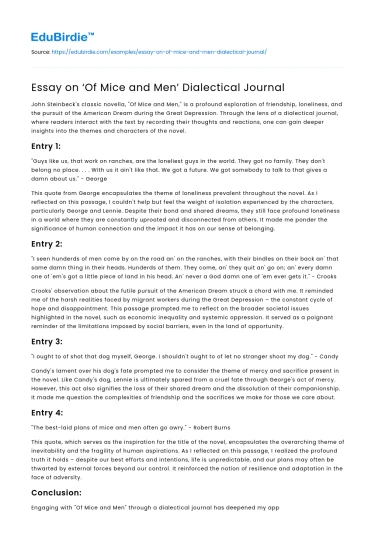John Steinbeck's classic novella, "Of Mice and Men," is a profound exploration of friendship, loneliness, and the pursuit of the American Dream during the Great Depression. Through the lens of a dialectical journal, where readers interact with the text by recording their thoughts and reactions, one can gain deeper insights into the themes and characters of the novel.
Entry 1:
"Guys like us, that work on ranches, are the loneliest guys in the world. They got no family. They don't belong no place. . . . With us it ain't like that. We got a future. We got somebody to talk to that gives a damn about us." - George
Save your time!
We can take care of your essay
- Proper editing and formatting
- Free revision, title page, and bibliography
- Flexible prices and money-back guarantee
This quote from George encapsulates the theme of loneliness prevalent throughout the novel. As I reflected on this passage, I couldn't help but feel the weight of isolation experienced by the characters, particularly George and Lennie. Despite their bond and shared dreams, they still face profound loneliness in a world where they are constantly uprooted and disconnected from others. It made me ponder the significance of human connection and the impact it has on our sense of belonging.
Entry 2:
"I seen hunderds of men come by on the road an' on the ranches, with their bindles on their back an' that same damn thing in their heads. Hunderds of them. They come, an' they quit an' go on; an' every damn one of 'em's got a little piece of land in his head. An' never a God damn one of 'em ever gets it." - Crooks
Crooks' observation about the futile pursuit of the American Dream struck a chord with me. It reminded me of the harsh realities faced by migrant workers during the Great Depression – the constant cycle of hope and disappointment. This passage prompted me to reflect on the broader societal issues highlighted in the novel, such as economic inequality and systemic oppression. It served as a poignant reminder of the limitations imposed by social barriers, even in the land of opportunity.
Entry 3:
"I ought to of shot that dog myself, George. I shouldn't ought to of let no stranger shoot my dog." - Candy
Candy's lament over his dog's fate prompted me to consider the theme of mercy and sacrifice present in the novel. Like Candy's dog, Lennie is ultimately spared from a cruel fate through George's act of mercy. However, this act also signifies the loss of their shared dream and the dissolution of their companionship. It made me question the complexities of friendship and the sacrifices we make for those we care about.
Entry 4:
"The best-laid plans of mice and men often go awry." - Robert Burns
This quote, which serves as the inspiration for the title of the novel, encapsulates the overarching theme of inevitability and the fragility of human aspirations. As I reflected on this passage, I realized the profound truth it holds – despite our best efforts and intentions, life is unpredictable, and our plans may often be thwarted by external forces beyond our control. It reinforced the notion of resilience and adaptation in the face of adversity.
Conclusion:
Engaging with "Of Mice and Men" through a dialectical journal has deepened my appreciation for Steinbeck's masterful storytelling and profound exploration of the human condition. Each entry prompted me to reflect on the themes, characters, and societal issues present in the novel, inviting me to consider their relevance to my own life and the world around me. Through this reflective process, I have gained valuable insights into the complexities of friendship, loneliness, sacrifice, and the pursuit of dreams – themes that continue to resonate with readers across generations.






 Stuck on your essay?
Stuck on your essay?

